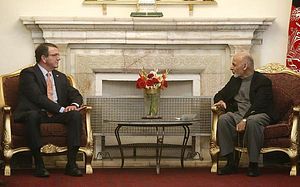Afghan President Ashraf Ghani began a state visit to the United States today amid widespread reports that the scheduled withdrawal of a majority of remaining U.S. forces in Afghanistan may be delayed given concerns about Afghan forces’ capabilities.
The issue of the U.S. troop withdrawal schedule will be the most scrutinized issue during Ghani’s visit, but the Afghan president’s tour of Washington D.C. and New York is multifaceted.
Ghani, who recently marked sixth months in office after coming to power in a troubled national election, will be eager to discuss Afghanistan’s post-war development and reconciliation process, and prospects for private U.S. investment in his country.
Ghani’s U.S. visit will be his first since assuming the presidency. Abdullah Abdullah, Afghanistan’s Chief Executive, is also in the United States.
Ghani’s official delegation will spend four days in Washington and one day in New York City, according to the U.S. Department of Defense.
On Sunday, Ghani met U.S. Defense Secretary Ashton Carter to discuss the flexibility of the U.S. troop withdrawal schedule from Afghanistan, concerns about the Iraq-based Islamic State making headway in Afghanistan, and the defense posture of Afghan forces.
Jeff Eggers, the U.S. National Security Council’s senior director for Afghanistan and Pakistan, notes that Ghani has requested that the Obama administration extend its current 9,800-troop levels beyond the end of 2015 and adjust to 5,500 in 2016.
The Obama administration, eager to stave off public criticism of what is the United States’ longest war, is considering the option.
Ghani’s inaugural state visit will be an opportunity for him to set himself apart from his predecessor Hamid Karzai. By the time he left office in September, Karzai was intransigent at best and accusatory at worst when it came to the U.S. mission in Afghanistan.
His administration was described as ungrateful for U.S. assistance by senior officials and observers in Washington. Ghani and Abdullah, by contrast, have been more cooperative with the United States since the start of their tenures.
For example, the U.S.-Afghanistan Bilateral Security Agreement (BSA), the document that set the terms for a post-2014 U.S. military presence in Afghanistan, was signed almost immediately after Ghani was sworn in.
Karzai had initially indicated that he would sign the document in late-2013 but later recanted, suggesting that his successors should deal with the issue.
Afghanistan continues to face a serious security problem stemming from the Taliban insurgency. Without a strong working bilateral relationship with the United States, the Afghan government will struggle to address this and other challenges.

































